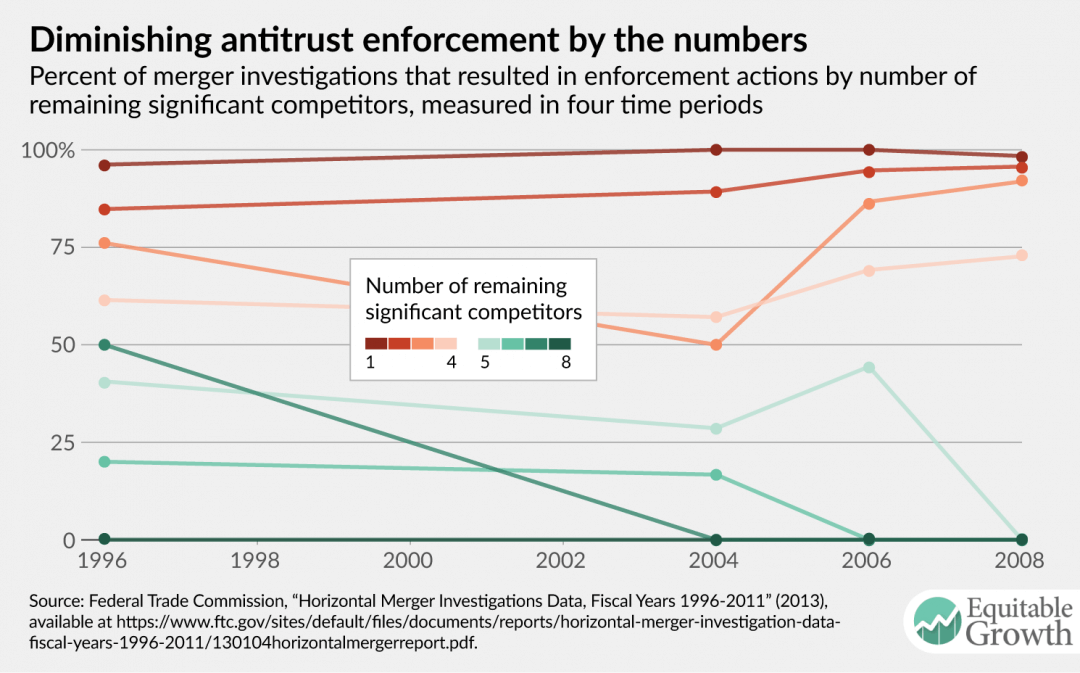Weekend reading: “the economic rents are too high” edition
This is a weekly post we publish on Fridays with links to articles that touch on economic inequality and growth. The first section is a round-up of what Equitable Growth published this week and the second is the work we’re highlighting from elsewhere. We won’t be the first to share these articles, but we hope by taking a look back at the whole week, we can put them in context.
Equitable Growth round-up
This week, Equitable Growth published two new working papers in its Working Paper Series.
The first paper, “Who Profits from Patents,” is by Heidi Williams at the Massachusetts Institute of Technology, Neviana Petkova at the U.S. Department of the Treasury, Patrick Kline at the University of California, Berkeley, and Owen Zidar at Princeton University. They found evidence that firms who secure patents do share the financial benefits from them with workers—but only those already earning the most. Read more about the study and its findings in Raksha Kopparam’s post on our Value Added blog.
The second working paper, “How does market power affect wages? Monopsony and collective action in an institutional context,” is by economists Mark Paul of New College of Florida and Mark Stelzner of Connecticut College. They construct a labor market model to better understand the theoretical implications of firms’ monopsony power. As the authors explain in a column on their paper, one of the main findings of their work is that unions, and collective labor action in general, are rent-reducing and efficiency-enhancing when monopsony power is present.
Equitable Growth also launched its new landing page for its Competitive Edge blog series, a monthly series featuring leading experts in antitrust enforcement on a broad range of competition-related topics, in a post by Raksha Kopparam providing an overview of the entries published so far. The latest entry is by John Kwoka, the Neal F. Finnegan Distinguished Professor of Economics at Northeastern University, who explains how a structural presumption in U.S. merger control policy would strengthen modern antitrust enforcement.
Michael Kades writes about the key takeaways for antitrust enforcement from Equitable Growth’s recent event, “Building a new consensus on antitrust reform,” which included a keynote address by Senator Amy Klobuchar (D-MN).
Greg Leiserson and Adam Looney, a senior fellow in Economic Studies at Brookings and the Director of the Center on Regulation and Markets at Brookings, have authored an issue brief setting out a new framework for economic analysis of tax regulations. Leiserson and Looney argue that the analysis of regulations should focus on the revenues raised and the economic burden imposed on the public, rather than attempting to quantify the net benefit or cost of a regulation, as doing the latter would require the agencies to make controversial assumptions about the social value of revenues and the appropriate distribution of the tax burden.
Read Brad Delong’s latest worthy reads.
Links from around the web
The Economist’s pick of the decade’s eight best young economists included five Equitable Growth grantees: Nathaniel Hendren of Harvard, Emi Nakamura of the University of California-Berkeley, Stefanie Stantcheva of Harvard, Amir Sufi of the University of Chicago Booth School of Business, and Heidi Williams of MIT. [economist]
The latest guidance from the Federal Reserve indicates that it plans to raise interest rates in 2019 in order to hit the inflation target half of its dual mandate. Narayana Kocherlakota, former President and CEO of the Federal Reserve Bank of Minneapolis, points out that the other half of its dual mandate, ensuring full employment in the economy, could suffer, as unemployment would likely rise as a result. [bloomberg]
As new businesses and jobs concentrate in urban areas, it’s difficult to design policies to help rural economies keep up. Eduardo Porter argues for policies that would encourage and help people to move where the jobs are. [nyt]
High school students from low-income families are less likely to enroll in selective four-year colleges even when they have the grades and test scores to get in. But a study by researchers at the University of Michigan found that just by sending a personalized letter to these students telling them that they qualify for existing financial aid programs increased applications by 40 percentage points and enrollment by 15 percentage points compared to a control group. [wapo]
Friday Figure


